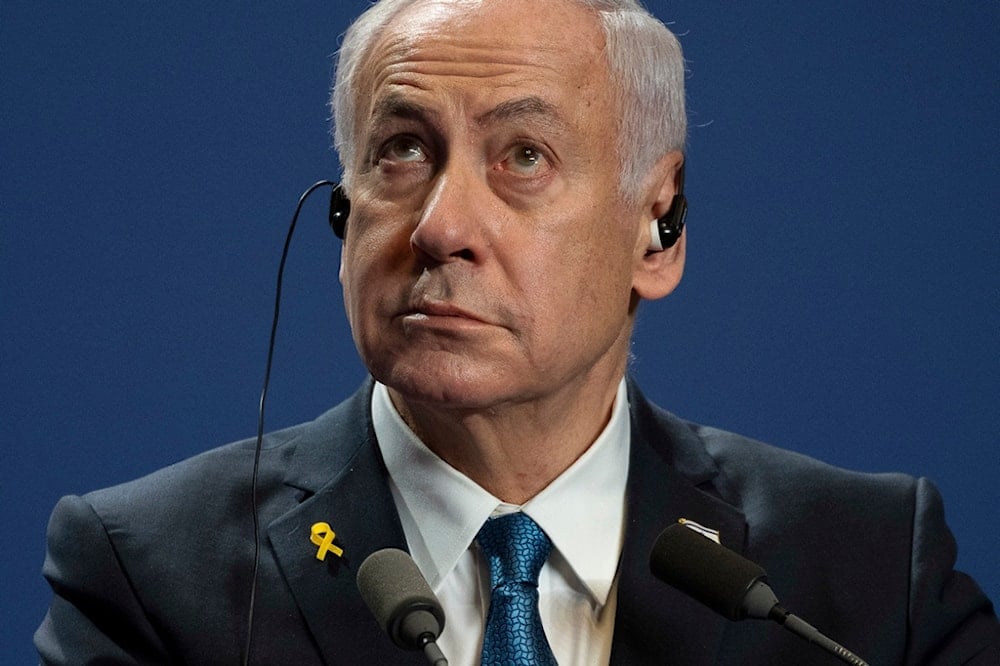Netanyahu contradicts Trump, threatens to bomb Iran
Israeli Prime Minister Benjamin Netanyahu demands the dismantling of Iran’s nuclear program, contradicting the US stance.
-

Israeli Prime Minister Benjamin Netanyahu looks up during a press statement at the Carmelite Monastery in the Buda Castle in Budapest, Hungary, April 3, 2025. (AP)
In a rare public divergence from US President Donald Trump, Israeli Prime Minister Benjamin Netanyahu called on Sunday for the complete dismantling of Iran's nuclear infrastructure, rejecting any deal that allows Tehran to continue enriching uranium.
Speaking from occupied al-Quds, Netanyahu insisted that "You have to dismantle [Iran's] nuclear infrastructure and that means ... they will not have the capacity to enrich uranium," adding that any deal should also "bring in the prevention of ballistic missiles."
He also stressed that any agreement must address Iran's ballistic missile capabilities, stating, "The real deal that works is the deal which removes Iran's capacity to enrich uranium for nuclear weapons."
US only wants to stop military production
Netanyahu's remarks follow statements by US officials indicating that the United States does not necessarily seek to stop Iran from enriching uranium entirely, as long as the program remains peaceful, which the Israeli regime vehemently opposes.
Tehran has repeatedly denied pursuing nuclear weapons, maintaining that its nuclear program serves peaceful purposes. The comments come as Iran and the United States engage in a new round of indirect nuclear negotiations, mediated by Oman.
Both sides described Saturday's talks as "positive and productive," with efforts underway to narrow differences before another round next week.
Trump believes US will make a deal with Iran
In an interview published Friday in Time magazine, US President Donald Trump said, "I think we're going to make a deal with Iran," while reiterating the possibility of military action if diplomacy fails.
Since February, Trump has reinstated a "maximum pressure" campaign against Tehran, having previously abandoned the 2015 nuclear agreement between Iran and six world powers in 2018 during his first term, subsequently reimposing crippling sanctions.
US Secretary of State Marco Rubio stated this week that under any prospective agreement, Iran would be required to completely cease uranium enrichment and instead import any enriched uranium needed to operate its sole functional nuclear power plant at Bushehr.
According to Iranian officials, Tehran is willing to negotiate certain restrictions on its nuclear activities in exchange for lifting sanctions. However, ending its enrichment program or relinquishing its enriched uranium stockpile remain among Iran’s "red lines" that are non-negotiable.
'Seriousness and determination on both sides'
Iranian Foreign Minister Abbas Araghchi expressed satisfaction with the talks process and its pace, emphasizing that the overall atmosphere is "positive and practical."
"The talks are extremely serious and technical ... there are still differences, both on major issues and on details," Araghchi told Iranian state TV.
"There is seriousness and determination on both sides ... However, our optimism about the success of the talks remains extremely cautious."
The Iranian foreign minister also noted that economic experts accompanied the Iranian delegation during this round, and experts from the Atomic Energy Organization of Iran are expected to join next week, reflecting a shift toward addressing more detailed aspects of the file.
"The presence of experts was beneficial ... we will return to our capitals for further reviews to see how disagreements can be reduced," Araghchi said.

 3 Min Read
3 Min Read










